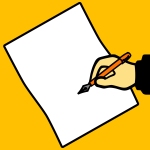 We’ve been gathering thoughts from our first Applied Comics Network meet-up. First up is Lydia Wysocki:
We’ve been gathering thoughts from our first Applied Comics Network meet-up. First up is Lydia Wysocki:
Well, I enjoyed that.
The three separate introductions to what we think ‘applied comics’ is worked well. They seemed to go in the right order too – John’s tour of examples from his own practice, Ian’s examples of different people’s practice, and my thoughts on principles (1: comics with specific purposes, a purpose akin to applied mathematics/applied linguistics, and 2: broader than non-fiction comics, facts are complicated) and all very exploratory at this stage – which I think is a very helpful start.
The Wikipedia roulette activity achieved multiple aims. It got people making comics, so we had something specific to discuss and all with a shared point of reference – it’s a medium not a genre, you know, which makes it even harder when comics colleagues are discussing a title/series/creator I’ve never heard of. None of us knew about Drake electoral ward in Plymouth, but that’s what Wikipedia roulette decided we’d make comics about (after a series of entries on American football players, one-line entries, and disambiguation pages it was a pretty darn appealing article). It got self-professed non-comics-makers and non-artists making comics, to focus on the decisions they made when making comics as much as the finished artwork itself. It had enough rules to get comics made and enough flexibility that art choices, reading beyond the Wikipedia page, and how closely to stick to the facts all became part of the small group discussion that followed. Splitting from a group of 24 into 4 groups of 6 worked well to make sure everyone had a chance to talk, then it was good to feed back to the whole group and see which points recurred in different small groups’ discussions.
The short presentations about specific projects were interesting both in themselves and to prompt further discussions. Including discussions we ran out of time for, but continued in the pub and hope to continue at future events. Selina Lock’s blog post does a great job of summarising the main points from presentations and discussions. I had a brief chat with John and with Hannah Sackett about whether there are particular art and writing styles that do or don’t work for particular information – can some information only be portrayed in a cute art style? or only in photorealistic art style? Whilst we think the only rule is that there are no rules (any information in any art style), I’d be interested to follow up any examples of style-and-content pairings that seem particularly surprising.
Most of all, the day reinforced my (and John’s and Ian’s) conviction that there’s interest in (and space and need for) a comics event that focusses on the making of comics. Most conference presentations I’ve seen are about the study of comics made by other people, and there was something in this presentations-then-discussions format that for me was more engaging than panel discussions. The table of showing and swapping comics was good, and an element of a comics convention that seemed to fit well for this event. The day after feeling of ‘that was awesome, and now everyone’s gone back to the rest of their lives’ was similar to comics conventions too. But we’ve already started planning the next event, so that helps.
– – – – –
Lydia Wysocki is one of the co-organisers of the Applied Comics Network. She edited the Newcastle Science Comic, Asteroid Belter for the British Festival of Science in 2013, makes comics, and runs Applied Comics Etc., “making awesome comics about specific information”. For more visit: Applied Comics Etc.
A comics event with the focus on the making of comics would be brilliant. With workshops.
The meet-up in London was great and really useful – looking forward to the next one.
LikeLike
Thanks Dr H!
LikeLike